|
|
|
Sort Order |
|
|
|
Items / Page
|
|
|
|
|
|
|
| Srl | Item |
| 1 |
ID:
085944
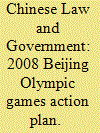

|
|
|
|
|
| Publication |
2008.
|
| Summary/Abstract |
Culture is an important component of the modern Olympic Games, and we must fully display the excellent achievements of our country's 5,000 years of traditional culture as well as the style and features of Beijing as a famous historical and cultural city.
|
|
|
|
|
|
|
|
|
|
|
|
|
|
|
|
| 2 |
ID:
133506
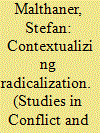

|
|
|
|
|
| Publication |
2014.
|
| Summary/Abstract |
This article proposes an analytical perspective on jihadist radicalization that focuses on the immediate social environment from which clandestine violent groups emerge, to which they remain socially and symbolically connected, and from which they receive some degree of support. Based on a detailed analysis of the "Sauerland-Group" it traces relational dynamics shaping individual pathways as well as processes of group formation within local Salafist milieus, the wider Salafist movement, and radical jihadist networks. It argues that one characteristic feature of "homegrown" jihadist groups is their simultaneous connection to and embeddedness in various different social contexts as well as the fluid, ad-hoc character of the clandestine group and its ambivalent relation with its supportive social environment
|
|
|
|
|
|
|
|
|
|
|
|
|
|
|
|
| 3 |
ID:
102168
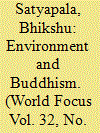

|
|
|
| 4 |
ID:
177089


|
|
|
| 5 |
ID:
124447


|
|
|
|
|
| Publication |
2013.
|
| Summary/Abstract |
This article explores some basic issues which arise from International Relations (IR) theory also being a form of social theory in a broader sense. Many of these issues are related to the question of a "social whole," that is, whether international relations/International Relations is one of many parts of a social whole, on what grounds it is differentiated from other parts, and whether it operates on a distinct level of social reality. We argue that these questions have been addressed in many forms of IR theory, but mostly only implicitly, and that the failure to make explicit assumptions about a social whole is probably due to the relative neglect of the subject in modern Sociology. The article argues that implicit assumptions about a social whole can be unearthed by looking at the concepts of systems, levels, and sectors, discussing debates about each of these in turn. Openly addressing IR theory as social theory, and spelling out images of a social whole, allows one to gain a sharper understanding of some of the basic analytical categories used, and to judge whether they form plausible delimitations of social reality within a wider social context.
|
|
|
|
|
|
|
|
|
|
|
|
|
|
|
|
| 6 |
ID:
119676
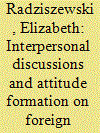

|
|
|
|
|
| Publication |
2013.
|
| Summary/Abstract |
This paper examines Polish support for the country's participation in the Iraq war in 2004. I argue that interpersonal discussions are a driving force behind emergent attitudes on foreign policy, such as support or opposition to war. I identify three mechanisms through which political discussions can influence individual's views on the war and develop hypotheses about the impact of kinship ties and frequency of discussions on strengthening the influence. I test my argument using the first large-N data on interpersonal discussions and foreign policy outside of the US context. Findings demonstrate that having a pro-war conversation partner greatly increases the probability that one will adopt similar views. They also show that when one's social environment is taken into account as the source of information about the policy, the impact of mass media diminishes.
|
|
|
|
|
|
|
|
|
|
|
|
|
|
|
|
| 7 |
ID:
132994
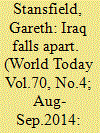

|
|
|
|
|
| Publication |
2014.
|
| Summary/Abstract |
The political and social environment among the Sunni rebels was primed for insurgency by 2013, if not before.
|
|
|
|
|
|
|
|
|
|
|
|
|
|
|
|
| 8 |
ID:
118741
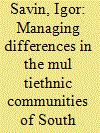

|
|
|
|
|
| Publication |
2012.
|
| Summary/Abstract |
Kazakhstan is frequently looked upon as a country that has succeeded in harmonizing an extremely ethnically and confessionally diverse social environment. There are indeed reasons for such inferences, one in particular being the absence of open mass opposition among different groups of the population in the Republic of Kazakhstan. However, this in no way means that the country's social development is entirely free of collisions or inter-group tension. Such conflict is apt to erupt whenever the government and society fail to react on time to the challenges arising in our ever complicated social world.
|
|
|
|
|
|
|
|
|
|
|
|
|
|
|
|
| 9 |
ID:
102783
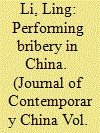

|
|
|
|
|
| Publication |
2011.
|
| Summary/Abstract |
Unlike most current academic studies on corruption in China, which focus on the theme of how political, economic and social environments have caused corruption at the macro-level, this paper takes a micro-view. It concentrates on the question of how corruption, notably bribery, takes place between a briber and the bribed. Moreover, it examines what exact role guanxi-practice plays in corrupt exchange and, more importantly, why it constitutes a critical element. Through in-depth case-studies derived from extensive fieldwork, this paper comes to the conclusion that the micro-level operation of corruption in China is not due to some haphazard aggregation of sporadic acts but follows certain rules and codes of conduct, which should be seen as an informal institutional mechanism facilitating the contracting process of corrupt exchange. This paper also demonstrates that guanxi-practice embodies such rules and codes of conduct. Such conduct purports to remove the legal, moral and cognitive barriers impeding the contracting process of corrupt exchange by grafting a corrupt agreement upon a social setting, in which risk of exchange safety is controlled, and moral costs and cognitive dissonance are reduced. Therefore, this paper contends that the causality link between guanxi-practice and corruption is the inverse of the view held by many. It is not that the participants of corruption are compelled to corrupt conduct because of the existence of the guanxi-practice, but on the contrary, these participants adopt guanxi-practice as an alternative operating mechanism that facilitates corruption.
|
|
|
|
|
|
|
|
|
|
|
|
|
|
|
|
| 10 |
ID:
141428
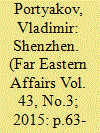

|
|
|
|
|
| Summary/Abstract |
The author looks at the unusual demography in Shenzhen and shows the ways the city residents use to cross the different status lines dividing them. He also gives a brief outline of job opportunities, wages, and social security provided to people through employment. Finally, he adds a word of praise for the labor unions and nongovernmental organizations for their prominent role in Shenzhen.
|
|
|
|
|
|
|
|
|
|
|
|
|
|
|
|
| 11 |
ID:
132799
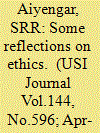

|
|
|
|
|
| Publication |
2014.
|
| Summary/Abstract |
The Greek word 'ethicos' which means character or manners. The horizon of this definition may further be expanded and the concepts of right or wrong behaviour or conduct are incorporated. As ethics acts as a guide of action, it can be also termed as a normative discipline. We are social creatures. More often than we realise, we get our cues for acceptable and unacceptable behavior from our environment as well as our intrinsic traits of character. This is even truer in the intense social environment of a military organisation or institution. Various ethical theories provide a system of rules or principles that guide us in making decisions about what is right or wrong and good or bad in a particular situation. It provides a basis for understanding what it means to be a morally decent human being. Stated another way, ethical theories when applied to leadership are about both, the actions of leaders and who they are as people. The choices leaders make and how they respond in a given circumstance are informed and directed by their ethics.
|
|
|
|
|
|
|
|
|
|
|
|
|
|
|
|
| 12 |
ID:
128221
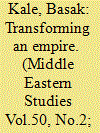

|
|
|
|
|
| Publication |
2014.
|
| Summary/Abstract |
The Ottoman Empire's immigration and settlement policies were redefined in the nineteenth and early twentieth centuries as a result of the population movements caused by the rise of nationalism, wars and territorial losses. With changing demographics and the acceptance of a new citizenship concept by the Tanzimat Edict in 1839, the millet system which had previously secured the multi-ethnic and multi-religious nature of the empire for centuries was challenged. The central argument of the paper is that the Ottoman state responded to these challenges by supporting a liberal migration and settlement policy in an institutionalized and highly complex structure through the pioneering Ottoman Migration Commission. Although certain restrictions later took place due to internal and external factors such as a changing economic, social and political climate, the institutionalized settlement and migration policy proves that a multi-dimensional system was developed in response to the challenges of a dissolving and yet transforming Empire.
|
|
|
|
|
|
|
|
|
|
|
|
|
|
|
|
| 13 |
ID:
143539
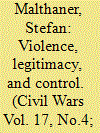

|
|
|
|
|
| Summary/Abstract |
When police moved against a mosque known to be a stronghold of al-Jamaa al-Islamiyya (The Islamic Group) in a neighbourhood in northeastern Cairo in summer 1988, they quickly became involved in street battles in which they were confronted not only by members of the militant Islamist group but also by many ordinary residents, including teenagers and elderly women throwing stones from balconies. It was obvious that the group had built a considerable base of support in the area: ‘They were very good young people’, one resident explained. The Islamists ‘used to have very active social work around their mosque. […] They collected donations for needy families and intervened in family disputes;’ and people, as he recounted, ‘admired their bravery to voice something the government does not want’ (Interview with residents of Ayn Shams, Cairo, March 2005). Yet, the resistance proved short-lived. When the neighbourhood was put under a curfew after the riots, people gradually withdrew from the group and many young followers shaved and changed their white galabiyya for a pair of trousers.
|
|
|
|
|
|
|
|
|
|
|
|
|
|
|
|
| 14 |
ID:
131064
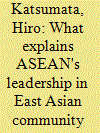

|
|
|
|
|
| Publication |
2014.
|
| Summary/Abstract |
Conventional wisdom holds that the Association of Southeast Asian Nations (ASEAN) has been able to lead community building in East Asia by default, against the background of Sino-Japanese rivalries. The present study maintains that this line of argument is insufficient, and offers a complementary account, centered on the statement that ASEAN has actively constructed a social environment which defines itself as the legitimate leader of East Asian community building. More specifically, the leadership of ASEAN can be explained in terms of three parallel developments since the early 1990s that are associated with the Asia-Pacific framework of the ASEAN Regional Forum (ARF): the Southeast Asian association has been able to lead community building in East Asia becauseissue_image_87_2_Katsumata (1) it has advanced the vision of an "East Asian community" by drawing on its cooperative security norm embodied in the ARF; (2) through their participation in the ARF process, the Northeast Asian powers have come to recognize the value of ASEAN's cooperative security norm, and thus to share with the Southeast Asian nations their vision of an East Asian community; and (3) the sharing of a community-building vision by all the East Asian countries has constituted a structure that makes it costly for the Northeast Asian powers to challenge the Southeast Asian association.
|
|
|
|
|
|
|
|
|
|
|
|
|
|
|
|
|
|
|
|
|